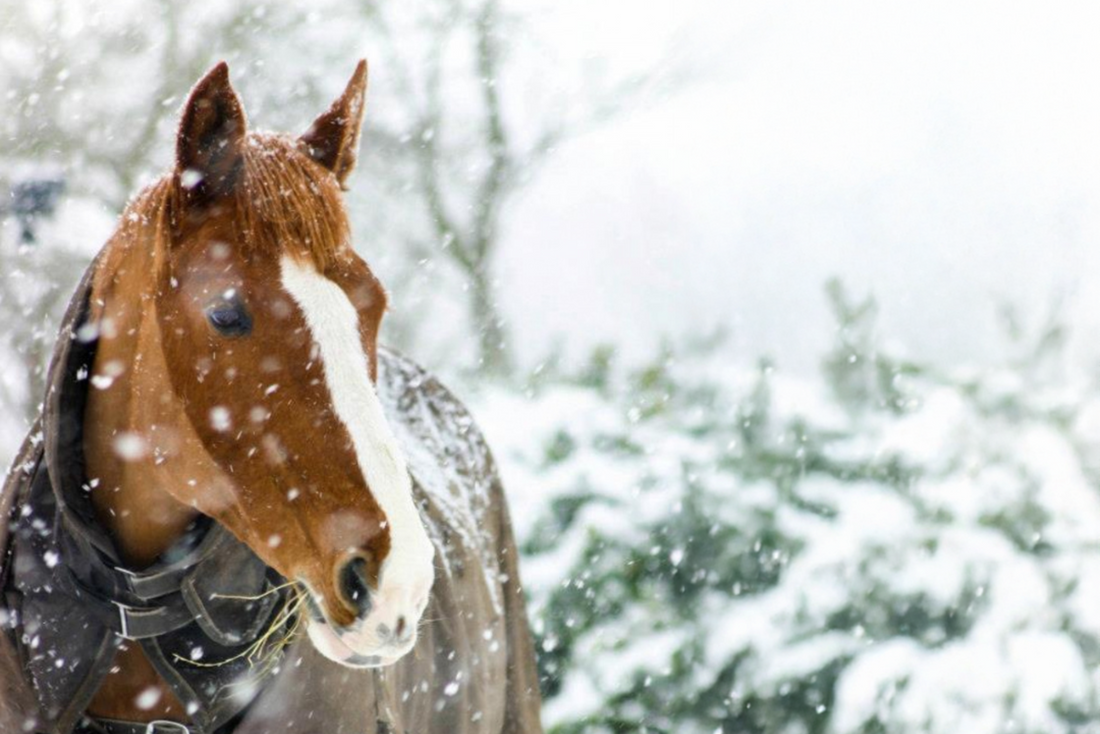Feeding Horses Through Winter – Adapting for Changing Needs

Written by Briony Witherow MSc RNutr. FHEA
As the evenings draw in and temperatures drop, most horse owners see their routines shift. Winter often means more time stabled, less turnout, and changes in workload. Some horses will be fit and hunting regularly, others will be enjoying a quieter season, but whatever their schedule, these management changes can have a big impact on gut health, weight, and condition.
Digestive Changes in Winter
Moving from summer grass to conserved forage (hay or haylage) is more than just a swap in feed. Grass is higher in moisture and lower in fibre than hay or haylage, so the digestive system goes from processing a moist, easy-to-digest forage to a drier, more fibrous one. Add in less exercise and reduced gut movement, and the risk of digestive problems such as impaction colic increases.
The horse’s hindgut is home to billions of microbes that break down fibre. These microbes become accustomed to specific feedstuffs, and when the diet changes, the microbial population must shift. Research suggests this adaptation can take 3–4 weeks. Sudden changes risk disrupting the balance, reducing fibre digestion and potentially leading to digestive upset.
Where Digestive Supplements Fit In
Digestive supplements containing prebiotics, probiotics, or both (synbiotics) can support the hindgut during periods of change.
- Probiotics (live yeast) can help repopulate the hindgut with beneficial fibre-digesting microbes after digestive upset, a sudden diet change, or periods of stress.
- Prebiotics encourage the proliferation of the horse’s existing beneficial microbes, offering longer-term support through seasonal changes, for horses with digestive sensitivity, or when feeding high-starch rations.
While these products are not a substitute for good management, having a targeted digestive supplement on standby in the feed room can help smooth the transition to winter feeding and support fibre digestion during inevitable management changes.
Water Intake – The Winter Challenge
Reduced movement, frozen troughs, and dried feeds can all contribute to lower water intake. This makes monitoring hydration a winter priority:
- Provide fresh, clean water at all times.
- Use buckets instead of automatic drinkers to track intake.
- Offer warmed water (20–35°C) to encourage drinking.
- Add salt to feed or provide a salt lick to meet sodium needs and stimulate thirst.
- Include succulents or soaked fibre feeds to boost moisture intake.
Supporting the Poor Doer
Cold weather increases calorie requirements. If your horse tends to lose weight in winter:
- Monitor body condition weekly so you can act early.
- Choose more digestible forage — earlier-cut hay or haylage is often more palatable and higher in calories.
- Consider forage analysis to understand calorie and nutrient content.
- Introduce higher-calorie feeds (e.g. conditioning cubes, high-oil feeds) in advance so the digestive system has time to adapt.
Managing the Good Doer
For horses that naturally hold condition, winter is a valuable opportunity to help them slim down and avoid year-on-year weight gain:
- Use lighter rugging and consider clipping to encourage energy (calorie) expenditure for warmth.
- Keep exercise levels up.
- Choose lower-calorie, later-cut forage.
- Provide only the essentials in the bucket feed — often just a balancer, fortified chaff, or vitamin/mineral supplement.
- Avoid high-calorie “pasture replacements” such as large quantities of dried grass products.
For All Horses – Keep the Gut Moving
Whether your horse is a poor or good doer, the principles for digestive health are the same:
- Base the diet on forage and make any changes gradually.
- Avoid long periods without fibre to keep the gut active and reduce ulcer risk.
- Use slow-feeding methods (small-holed nets, double netting, multiple haynets spread around the stable) to extend chewing time.
- Consider targeted digestive support during transitions to help the hindgut adapt smoothly.
Take-Home Points
- Plan forage changes in advance and introduce gradually over weeks, not days.
- Monitor weight and condition weekly and adapt the diet before problems develop.
- Promote water intake to reduce colic risk.
- Match forage quality and energy level to your horse’s needs — one size doesn’t fit all.
- Support the hindgut with pre- and probiotics during dietary change or digestive stress.
By combining good winter management with targeted digestive support where needed, you can keep your horse’s gut healthy and resilient right through to spring.
